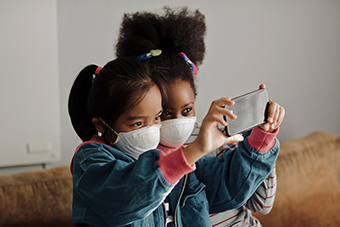Top health concerns for 2025


Top health concerns for 2025
Parent perceptions about child health issues can influence their parenting decisions, their support for advocacy or political campaigns, or their interest in searching for information. The C.S. Mott Children’s Hospital National Poll on Children’s Health asked a national sample of parents of children 1-18 years about their views on an array of child health topics.
Overall, 69% of parents think the physical health of US children and teens is getting worse, and 83% think the mental health is getting worse. The leading topics that parents rate as a big problem for US children and teens are:
- Social media (75%)
- Too much screen time/use of devices (75%)
- Internet safety (66%)
- Unhealthy diet (62%)
- Child/teen mental health (62%)
- Cost of healthcare/health insurance (56%)
- Obesity (56%)
- Smoking/vaping (56%)
- Bullying (54%)
- School violence (54%)
Other topics rated by parents as a big problem are lack of physical activity (52%), guns/gun injuries (51%), child abduction/sex trafficking (48%), drinking/using drugs (47%), lack of mental health services (44%), poverty (44%), child abuse/neglect (42%), parental stress (39%), inaccurate/misleading health information (37%), unequal access to healthcare (37%), teen pregnancy/sexual activity (34%), discrimination due to race or gender (31%), worsening air and water quality (31%), and safety of food supply (30%).
Nearly all parents (96%) rate at least one topic as a big problem for US children and teens, and 63% rate ten or more topics as a big problem. Mothers are more likely than fathers to rate certain issues as big problems, including mental health, bullying, school violence, and child abduction/sex trafficking (see Figure).
Three in five parents (59%) report having at least one question about their own child’s health, most often related to nutrition/physical activity (29%), mental health (22%), general questions about parenting and keeping their child healthy (15%), or technology/social media (12%).

Highlights
- Parents rate too much screen time/use of devices and social media as top health concerns.
- Moms have higher levels of concern than dads about mental health and child safety.
- Parents have the most questions about their child’s nutrition/physical activity.
Implications
This Mott Poll shows that parents think the health of US children and teens is going in the wrong direction, with two-thirds saying children’s physical health is getting worse, and 4 in 5 saying children’s mental health is getting worse. These views may emanate from what parents see firsthand in their own children and other children in their community, or what they read or hear about secondhand.
Leading the top ten child health concerns of US parents are three closely related topics: social media, too much screen time, and internet safety. Combined, they represent the pervasive presence of technology in children’s lives which may have impacts that vary at different ages. Parents of young children may think about recommendations to limit screen time due to its effect on children’s attention and learning, while parents of older children may think about how social media can influence their child’s self-image and their views about the world.
This impact of social media may be associated with other issues parents noted as big problems, including mental health. Since the increased use of social media starting around 2010, the prevalence of mental health problems in youth has also increased significantly. This increase, particularly in depression, anxiety and suicidal thoughts continued through the COVID-19 pandemic years, especially among teen girls. Mothers in this Mott Poll were more likely than fathers to rate mental health as a big problem; this may indicate that mothers are more likely to talk with their children, particularly their daughters, about their feelings, or that they are more attuned to mental health in general.
Other related issues near the top of parents’ concerns are unhealthy diet (#4), obesity (#7), and lack of physical activity (#11). This was also the leading area where parents had questions about their own child, likely reflecting the real-world challenges of finding accessible and affordable options to ensure kids get a balanced diet and regular physical activity. Excess weight is a problem affecting a larger proportion of youth over recent years which puts them at risk of poorer physical and mental health. Good nutrition and increased physical activity not only help children achieve and maintain a healthy weight, but they are also associated with improved cognitive functioning at school, better emotional health, and better quality of life. Primary care providers are a good resource to help families adopt healthy lifestyle habits and navigate the challenges faced by children with excess weight.
Of note, bullying and school violence were among the top ten concerns for parents, with more than half of the parents responding to the poll indicating that these are big problems. Particularly with bullying in the era of social media, as it is often not limited to school and can cause serious disruptions to children’s quality of life. Parents, health care providers, and teachers may together be able to help address concerning situations when they arise, but also actively work to increase empathy, kindness, and acceptance that would decrease conflict and foster connections between students.
An important benchmark in this Mott Poll is the 56% of parents who rated the cost of healthcare and health insurance for children as a big problem. In addition, 44% of parents indicated that lack of mental health services for children is a big problem. As policy changes go into effect, particularly those related to Medicaid, these concerns may become a bigger issue for US families. Regular access to healthcare for physical and mental health is important, as children’s healthcare providers should be partners for parents and children as they navigate the top child health issues of the day.



Data Source & Methods
This report presents findings from a nationally representative household survey conducted exclusively by Ipsos Public Affairs, LLC (Ipsos) for C.S. Mott Children’s Hospital. The survey was administered in February 2025 to a randomly selected, stratified group of adults who were parents of at least one child age 1-18 years living in their household (n=2,021). Adults were selected from Ipsos’s web-enabled KnowledgePanel® that closely resembles the U.S. population. The sample was subsequently weighted to reflect population figures from the Census Bureau. The survey completion rate was 67% among panel members contacted to participate. The margin of error for results presented in this report is ±1 to 3 percentage points.
Findings from the C.S. Mott Children’s Hospital National Poll on Children’s Health do not represent the opinions of the University of Michigan. The University of Michigan reserves all rights over this material.
Citation
Woolford SJ, Schultz SL, Gebremariam A, Frisk C, Clark SJ. Top health concerns for 2025. C.S. Mott Children's Hospital National Poll on Children's Health, University of Michigan. Vol 47, Issue 6, August 2025. Available at: https://mottpoll.org/reports/top-health-concerns-2025.



